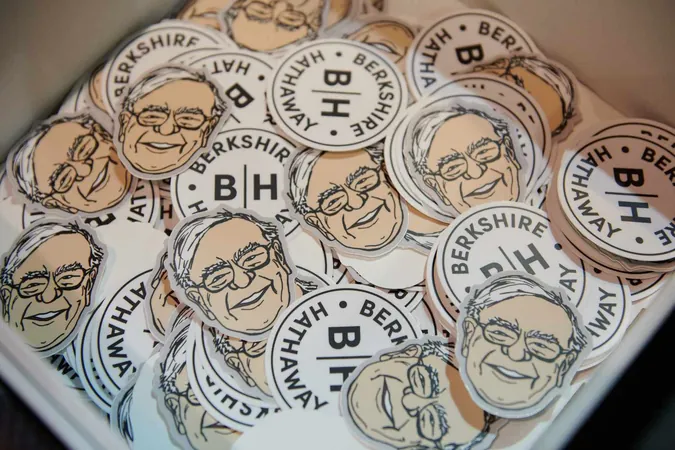
Warren Buffett's Bold Move: Why Is He Offloading Stocks Like Crazy?
2024-11-15
Author: Ting
Warren Buffett's Surprising Turn
Warren Buffett is making headlines once again as his investment firm, Berkshire Hathaway, takes a surprising turn by selling off a significant amount of stock. Recent regulatory filings reveal that Buffett's company has continued to offload more shares than it acquires in the third quarter of the year, including a staggering reduction of one-fourth of its stake in the tech giant Apple Inc.
Berkshire Hathaway has slashed its investment in Apple from nearly $175 billion at the beginning of the year to around $70 billion by the end of September, making Apple a notable yet still substantial part of Berkshire's $266 billion equity portfolio, representing roughly a quarter of it. This strategic move has raised eyebrows, particularly among investors and market analysts who are keenly watching Buffett’s actions for insight into broader market trends.
In addition to Apple, Berkshire Hathaway has divested approximately 235 million shares of Bank of America, a transaction that had already been somewhat anticipated due to regulatory obligations linked to owning over 10% of the bank.
Cash Reserves Hit New Heights!
Berkshire Hathaway's cash reserves have reached a staggering $320.3 billion in the third quarter, up from $271.5 billion in the previous quarter. A remarkable $288 billion of this cash is currently tucked away in short-term Treasury bills. This trend of growing cash—a streak that has lasted for nine consecutive quarters—has led many to speculate about Buffett’s next strategic move.
Investors are keeping a close eye on this cash stash, often referred to as "dry powder," which Buffett might use for future investments when the market conditions are more favorable. There’s a growing consensus that the "Oracle of Omaha" is becoming increasingly cautious, perhaps indicating that he perceives limited growth potential in the current market climate.
A critical tool that Buffett uses to assess market valuations is the so-called "Buffett Indicator," which is the ratio of the stock market’s total capitalization to the Gross Domestic Product (GDP) of the United States. Recently, this ratio hit an all-time high of 198.1%, a figure which Buffett has historically viewed with skepticism. In a noteworthy commentary in a 2001 Fortune article, he warned that "if the ratio approaches 200%—as it did in 1999 and part of 2000—you are playing with fire."
As the market reaches such staggering valuations, the fear among some investors is that it may be on the brink of a correction, making Buffett's cash position not just a hedge but a potential lifeline for future investment opportunities.
Conclusion
In conclusion, Warren Buffett’s decision to sell off stocks at this moment underscores a cautious, perhaps even defensive, approach to market dynamics. As his cash pile reaches unprecedented levels, investors and market watchers will be eager to see how he plans to deploy it in the face of a possibly overvalued market. Will Buffett strike when the time is right, or will he continue to play it safe? Only time will tell!

 Brasil (PT)
Brasil (PT)
 Canada (EN)
Canada (EN)
 Chile (ES)
Chile (ES)
 Česko (CS)
Česko (CS)
 대한민국 (KO)
대한민국 (KO)
 España (ES)
España (ES)
 France (FR)
France (FR)
 Hong Kong (EN)
Hong Kong (EN)
 Italia (IT)
Italia (IT)
 日本 (JA)
日本 (JA)
 Magyarország (HU)
Magyarország (HU)
 Norge (NO)
Norge (NO)
 Polska (PL)
Polska (PL)
 Schweiz (DE)
Schweiz (DE)
 Singapore (EN)
Singapore (EN)
 Sverige (SV)
Sverige (SV)
 Suomi (FI)
Suomi (FI)
 Türkiye (TR)
Türkiye (TR)
 الإمارات العربية المتحدة (AR)
الإمارات العربية المتحدة (AR)